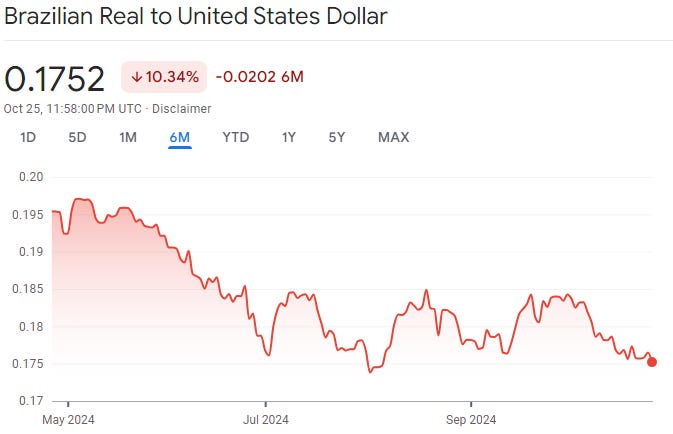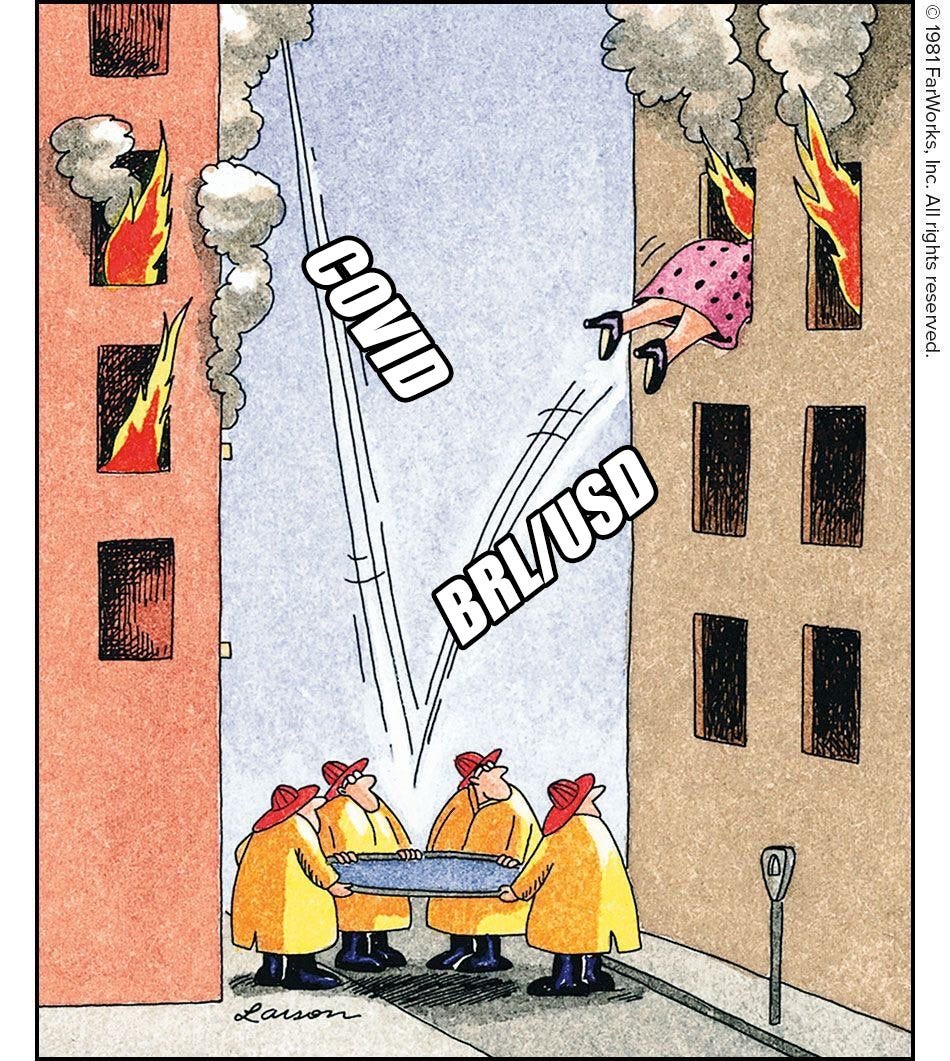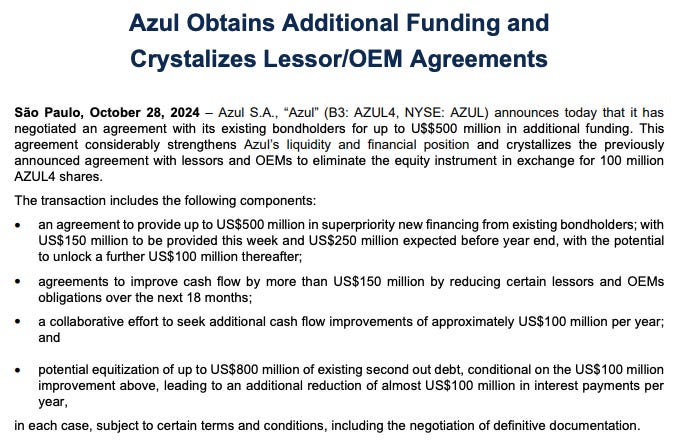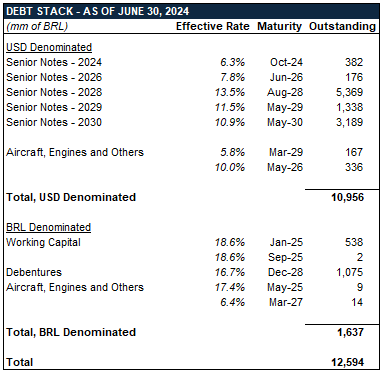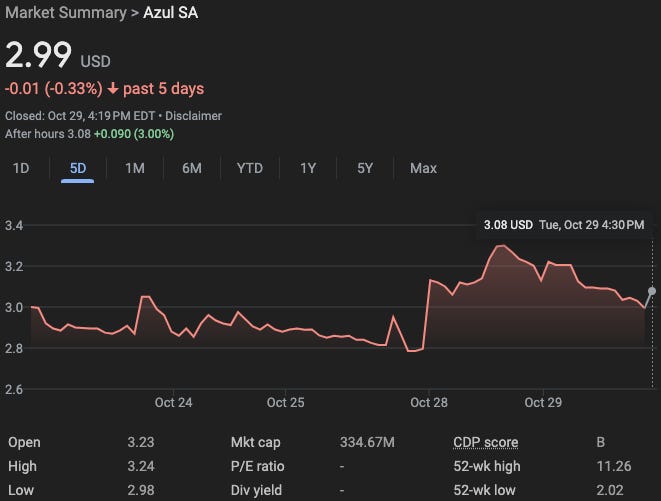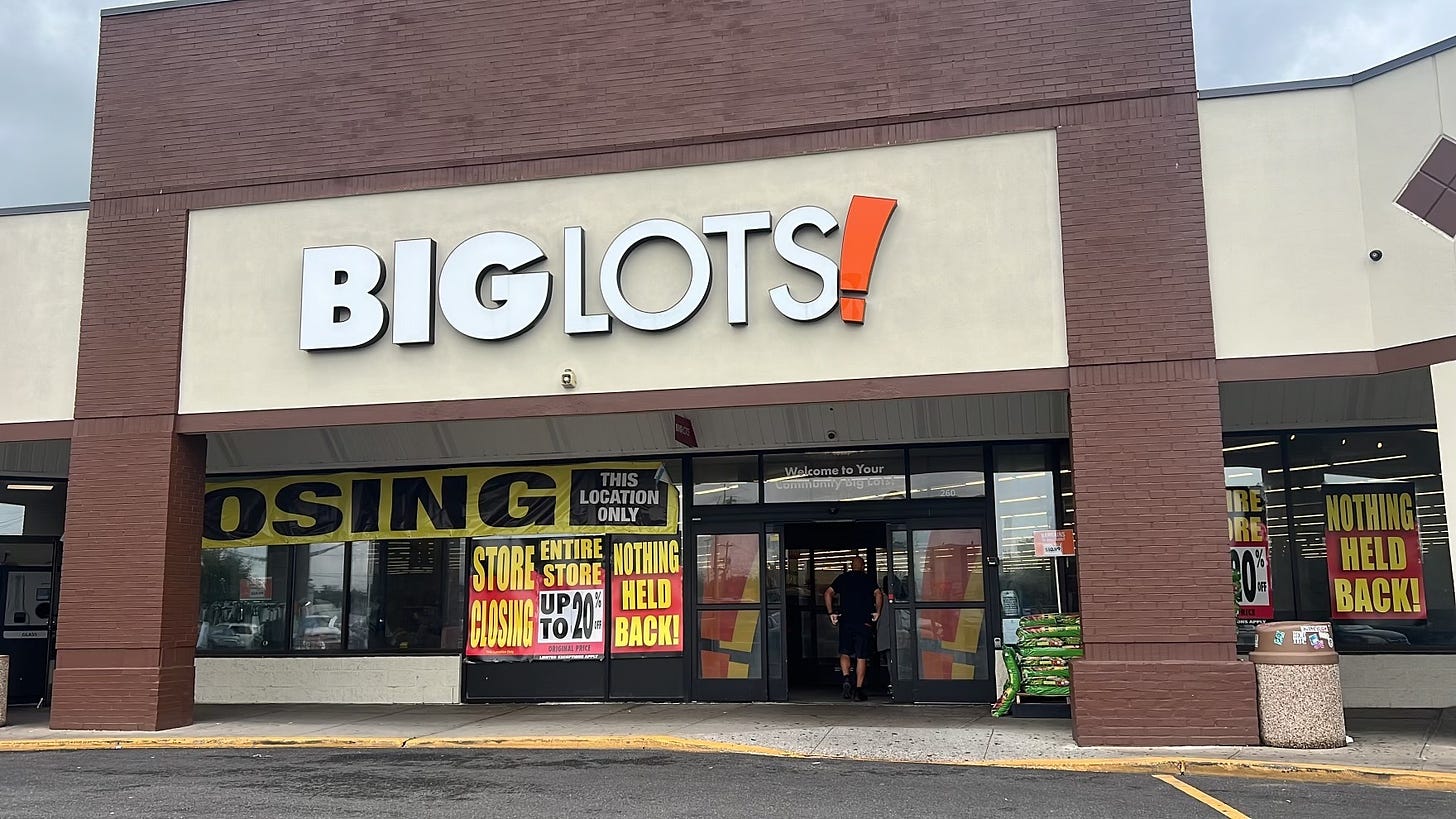We bet there were a good number of you who took advantage of the stronger dollar this past summer:


Per the Wall Street Journal:
“Rent and other living expenses are rising in hot spots, making it harder for many locals to make ends meet. A heightened focus on tourism, which turns a quick profit but remains a low-productivity activity, tethers these economies to a highly cyclical industry. It also risks keeping workers and capital from more profitable areas, like tech and high-end manufacturing.”
So, while you were hunting for your best Donald Trump-orange tan on the beaches of Mykonos and Marseilles, know that you were also indirectly feeding into the local economy’s low-productivity fly wheel. Yeah, shame on you.
Anyway, the strong dollar ripped through the global economy in other ways too … which brings us to Azul S.A. ($AZUL).
Azul is one of the largest Brazilian air carriers. The company operates ~1k flights a day to over 160 destinations with its fleet of over 180 aircraft.
Its situation differs from Spirit Airlines Inc. ($SAVE), which we covered last week …
… because there’s no failed merger, Azul isn’t an ULCC, and, at face value, the company doesn’t seem to be doing terribly:
Like c’mon, 20%+ EBITDA margins?
For an airline.
You start to see cracks, however, when you scroll down to this section of the financials:
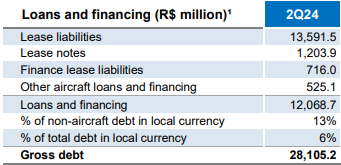
Take a look at that “% of total debt in local currency” line item. That means the overwhelming majority of Azul’s debt is USD denominated.
Now take a look at this:
In the span of one quarter, the BRL to USD exchange rate dropped by over 11%.
Meaning … if we zoom out from the previous gross debt chart and compare the 2Q’24 debt figure to 1Q’24:
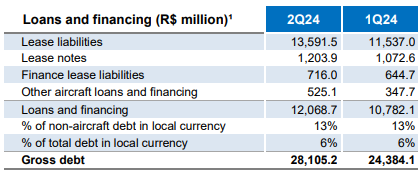
Yup, the company saw gross debt increase by R$3.7b or 15.3% QoQ, spiking net debt to EBITDA from 3.7x to 4.5x. There’s R$5.6b worth of leases and ~R$1.8 of debt coming due through ‘25 — amounts set to squeeze the company’s R$1.4b 2Q’24 cash balance. In other words, Azul jumped out of the frying pan (COVID) into the fire.
As you can imagine, the rating agencies saw these currency trends and went to work:
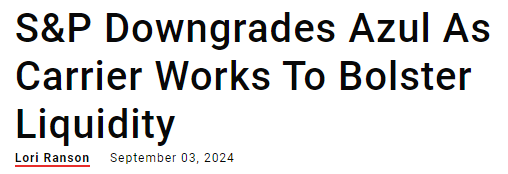


The company can maybe squeeze out R$3b in cash in the next year through operations but that’s still not enough to address the upcoming payments. So management has been franticly negotiating its lease terms. The hard work (kind of) paid off when management negotiated an agreement with the company’s lessors and OEM partners relating to R$3b worth of debt. The lessors and OEMs agreed to exchange those obligations for 100mm in new preferred shares of Azul, conditioned on “the raising of additional financing.” A condition that, for a brief period, had been quite tough to meet:

Womp womp.
Renegotiating leases is great and all, but the real litmus test was obtaining new capital. Without new capital and/or another lease deal, Azul would inch closer to chapter 11.*
Right, but — ⚡️ BUT ⚡️ — (1) there’s a ton of capital out there and (2) existing lenders in cap stacks are perfectly willing to play ball in LM deals these days. And so, well, the company announced this on October 28, 2024:
Alright, there’s a lot there. First, let’s take a look at the debt stack as of June 30, 2024:
The company issued the ‘28, ‘29, and ‘30 notes last year; the ‘29 and ‘30 notes were a part of an exchange offer for the ‘24 and ‘26 notes. All three notes share a collateral package with the ‘28 notes being “first out” and the ‘29 and ‘30 notes being “second out.”
~1 year later and the company is now proposing another exchange offer for “super priority” status. Any holdouts who do not participate, well…
“Any holders that do not participate in such contemplated exchange offers and consent solicitations would remain with existing, but unsecured, 2028, 2029 and 2030 notes.” (emphasis added)
Collateral…
However, even if a bondholder does participate, they’ll still be junior on the shared collateral to the $500mm in super priority funding coming in from an ad hoc group of bondholders representing more than 66.7% of the ‘28 notes, the ‘29 notes, and the ‘30 notes.** This is how the company is satisfying the financing requirement under the aforementioned lease negotiation.
A new subsidiary, Azul Secured Finance II LLP, is issuing the super priority debt, and, notably:
“The financing will be issued by Azul Secured Finance II LLP and guaranteed by Azul S.A. and certain of its subsidiaries and will be secured by: (i) certain receivables generated by, and intellectual property used in, the Azul Cargo business, (ii) a pledge of certain financial assets held by Azul, (iii) certain credit and debit card receivables generated by Azul’s passenger airline business, and (iv) the shared collateral that currently secures the existing 2028, 2029 and 2030 notes, which is shared pursuant to requisite consents obtained from the holders of the relevant existing secured indebtedness.” (emphasis added)
Azul Cargo is was one of the last remaining unencumbered assets that management had up its sleeve. Per an August 28, 2024 press release:
“Furthermore, as we also reported in our call, we have additional cash-raising opportunities using Azul Cargo as collateral, with a first-out capacity of up to US$800 million.”
Basically, management has pulled the emergency liquidity lever to get this deal done.
There’s also a contemplated equitization of the ‘29 and ‘30 notes, subject to certain conditions that includes substantially all of the second out debt agreeing to participate.
The ‘28s were last pricing at $97.38 according to FINRA. As of Monday, the ‘29 and ‘30 notes were pricing at $56 and $68, respectively.
Not a bad series of events. Azul eliminated R$3b in debt, obtained $500mm (~R$2.8b) of new capital, and may also slash its debt outstanding through an equitization. The stock spiked 17% on news of the financing before giving back some of the gains:
Assuming the entirety of the financing goes through, the company bought itself a decent amount of additional runway.
Now let’s see what it can do with it.
*It’s just a little bit ironic that the company once reportedly interested in acquiring its bankrupt competitor, GOL Linhas Aéreas Inteligentes S.A., could end up in bankruptcy court as well.
**This group also includes 95.6% of the convertible debentures.
⚡Update: Big Lots Inc.⚡
Recall that in last week’s Big Lots Inc. update…
… both the official committee of unsecured creditors (“UCC”) and the U.S. Trustee (“UST”) objected to the debtors’ proposed bidding procedures motion — specifically, Nexus Capital Management LP’s (“Nexus”) stalking horse bid protections.
You may recall that Nexus had been deemed the “stalking horse” but had an itty bitty problem; it was still trying to secure financing for the transaction! And by the time of the October 21 hearing on the bidding procedures motion, Nexus still hadn’t secured commitment letters that would prove it could close.
And while the debtors were able to satisfy the UCC objection by adding language that ensured the bid protections would only become effective IF Nexus obtains the necessary commitment letters by October 23 (the bid deadline), the UST persisted, leading to a contested hearing.
The UST didn’t think the bid protections (break-up fee + expense reimbursement) were warranted and, even if allowed, definitely shouldn’t be given super priority status. Judge Stickles would rule on this at a later hearing, but, first, the court made its position known early on during the October 21 hearing:
“I am struggling very much in this case with a stalking horse who … essentially got a contingent commitment … as to why this isn’t being heard with respect to bid protections at a later hearing.”
Timing is important here. Again, the hearing happened on Monday, October 21. The debtors were proposing that Nexus would have to cough up their proof of financing by Wednesday, October 23, which also happened to be the bid deadline. So Judge Stickles was a little perplexed:
“Bids are due the same day that Nexus is supposed to get commitment, correct? So how does this play to other bidders?”
“So they have to meet a minimum overbid even if the financing isn’t available for Nexus?”
“Is [Nexus] even a qualified bidder?”
“Let me just ask the fundamental question: why is this being pushed today when in 48 hours you’re going to know whether or not they have financing? Why wasn’t the whole schedule modified to coincide with the ability to have financing so people know truly what the floor is?”
Great questions, Judge Stickles!
Here’s a live shot of the debtors, under fire from the bench:
After convening with the stalking horse and coming back for a follow-up hearing on October 25, the debtors agreed to push (i) the bid deadline to October 28 at 12pm ET and (ii) the auction to October 30 at 10am ET. During that same hearing the debtors also confirmed that Nexus had finally obtained commitment letters, so we can finally close the book on that dumb-as-all-holy-f*ck issue. Judge Stickles, who nailed the idiocy of this timeline, gave her ruling on the UST objections.
And?
She approved Nexus’ bid protections, but agreed with the UST that the bid protections should not be given super priority status. We’re chalking this one up as a win for the newly emboldened and empowered UST.
Now with Nexus having secured financing and Judge Stickles streamlining the schedule and ruling on the bid protections issue, we look forward to any potential surprise bidders in advance of a sale hearing scheduled for November 12 at 1:30pm ET.
📤 Notice📤
Esther Hong (Associate) joined Glenn Agre Bergman & Fuentes LLP from Weil Gotshal & Manges LLP.
🍾Congratulations to…🍾
ABI’s 2024 “40 Under 40” award recipients:
Olya Antle of Cooley LLP (Washington, D.C.)
Gemma Bellfield of Ogier (Camana Bay, Grand Cayman, Cayman Islands)
Lauren Berret of Eisner Advisory Group, LLC (Philadelphia)
Joseph Boufadel of Salvato Boufadel LLP (Los Angeles)
Annmarie Chiarello of Winstead PC (Dallas)
Rahman Connelly of Pillsbury Winthrop Shaw Pittman LLP (New York)
Elliot Crowder of Stevenson & Bullock, P.L.C. (Southfield, Mich.)
Jingzhi Dai of Jefferies LLC (New York)
Marguerite Lee DeVoll of Watt, Tieder, Hoffar & Fitzgerald, LLP (McLean, Va.)
Jodi Dubose of Stichter Riedel Blain & Postler (Pensacola, Fla.)
Brittany Falabella of Hirschler Fleischer, P.C. (Richmond, Va.)
Aryeh Falk of Davis Polk & Wardwell LLP (New York)
Jace Ferraez of the U.S. Bankruptcy Court for the Northern District of Mississippi (Aberdeen)
Kellie Fisher of Drummond Woodsum (Portland, Maine)
Emily Geier of Kirkland & Ellis (New York)
Christopher Hampson of the University of Florida Levin College of Law (Gainesville, Fla.)
Michael Handler of King & Spalding LLP (New York)
Julie Harrison of Norton Rose Fulbright (Houston)
Cole Hayes of Hayes Law (Charlotte, N.C.)
Camber Jones of Spencer Fane LLP (Springfield, Mo.)
Thomas Kessler of Cleary Gottlieb Steen & Hamilton LLP (New York)
Nick Koffroth of Fox Rothschild (Los Angeles)
Daniel Kokini of FTI Consulting, Inc. (New York)
Nicholas Laue of Keller & Almassian, PLC (Grand Rapids, Mich.)
Nienke Lillington of Campbells LLP (George Town, Grand Cayman, Cayman Islands)
Jessica Mendez-Colberg of Student Loan Advisors PR (Ponce, P.R.)
Mark Moore of Foley & Lardner LLP (Dallas)
Meaghan Murphy of Meland Budwick, P.A. (Miami)
Daniel Newman of Tonkon Torp LLP (Portland, Ore.)
Michael Papandrea of Lowenstein Sandler LLP (Roseland, N.J.)
Dana Robbins of Burr & Forman (Tampa, Fla.)
Christina Sanfelippo of Cozen O'Connor (Chicago)
Gabriel Sasson of Paul Hastings LLP (New York)
Adam Searles of AlixPartners, LLP (New York)
Emily Shanks of Gray Reed (Dallas)
Mark Sidorenkov of Alvarez & Marsal North America, LLC (Scottsdale, Ariz.)
Debra Sinclair of Willkie Farr & Gallagher LLP (New York)
Darius Tay of BlackOak LLC (Singapore)
Susan Adams Tran of Tran Singh LLP (Houston)
Maurice VerStandig of The VerStandig Law Firm, LLC (Potomac, Md.)
John Weber of Paul, Weiss, Rifkind, Wharton & Garrison LLP (New York)
Daniel Gwen for getting promoted to Partner at Ropes & Gray LLP.
Matt Talmo for getting promoted to Partner at Morris Nichols Arsht & Tunnell LLP.
Michael Slade on his appointment to a 14-year term as United States Bankruptcy Judge for the Northern District of Illinois. Mr. Slade is a partner at Kirkland & Ellis LLP.
Morrison & Foerster LLP (Lorenzo Marinuzzi, Doug Mannal, Oksana Lashko, Raff Ferraioli, Miranda Russell, Joseph Murphy, Jennifer Marines, Ilayna Guevrekian, Theresa Foudy, Benjamin Butterfield, Chane Buck)(anyone else, guys?!?) and Morris James LLP (Eric Monzo, Brya Keilson, Siena Cerra) for securing the legal mandate on behalf of the official committee of unsecured creditors in the Accuride Corporation chapter 11 bankruptcy cases.
Pachulski Stang Ziehl & Jones LLP (Bradford Sandler, Colin Robinson, Edward Corma, Robert Feinstein, Paul Labov, Cia Mackle) for securing the legal mandate on behalf of the official committee of unsecured creditors in the True Value Company LLC chapter 11 bankruptcy cases.
Potter Anderson & Corroon LLP (Christopher Samis, R. Stephen McNeill, Gregory Flasser, Sameen Rizvi) for securing the legal mandate on behalf of the official committee of unsecured creditors in the Jordan Health Products I Inc. (d/b/a Avanta Health Solutions) chapter 11 bankruptcy cases.
Orrick Herrington & Sutcliffe LLP (Raniero D’Aversa, Mark Franke, Nicholas Poli, Jenna MacDonald Busche, Michael Trentin, Brandon Batzel) and Cole Schotz PC (Justin Alberto, Stacy Newman, Michael Fitzpatrick, Melissa Hartlipp) for securing the legal mandate on behalf of the official committee of unsecured creditors in the HDC Holdings II LLC chapter 11 bankruptcy cases.
📚Resources📚
We have compiled a list of a$$-kicking resources on the topics of restructuring, tech, finance, investing, and disruption. 💥You can find it here💥.






